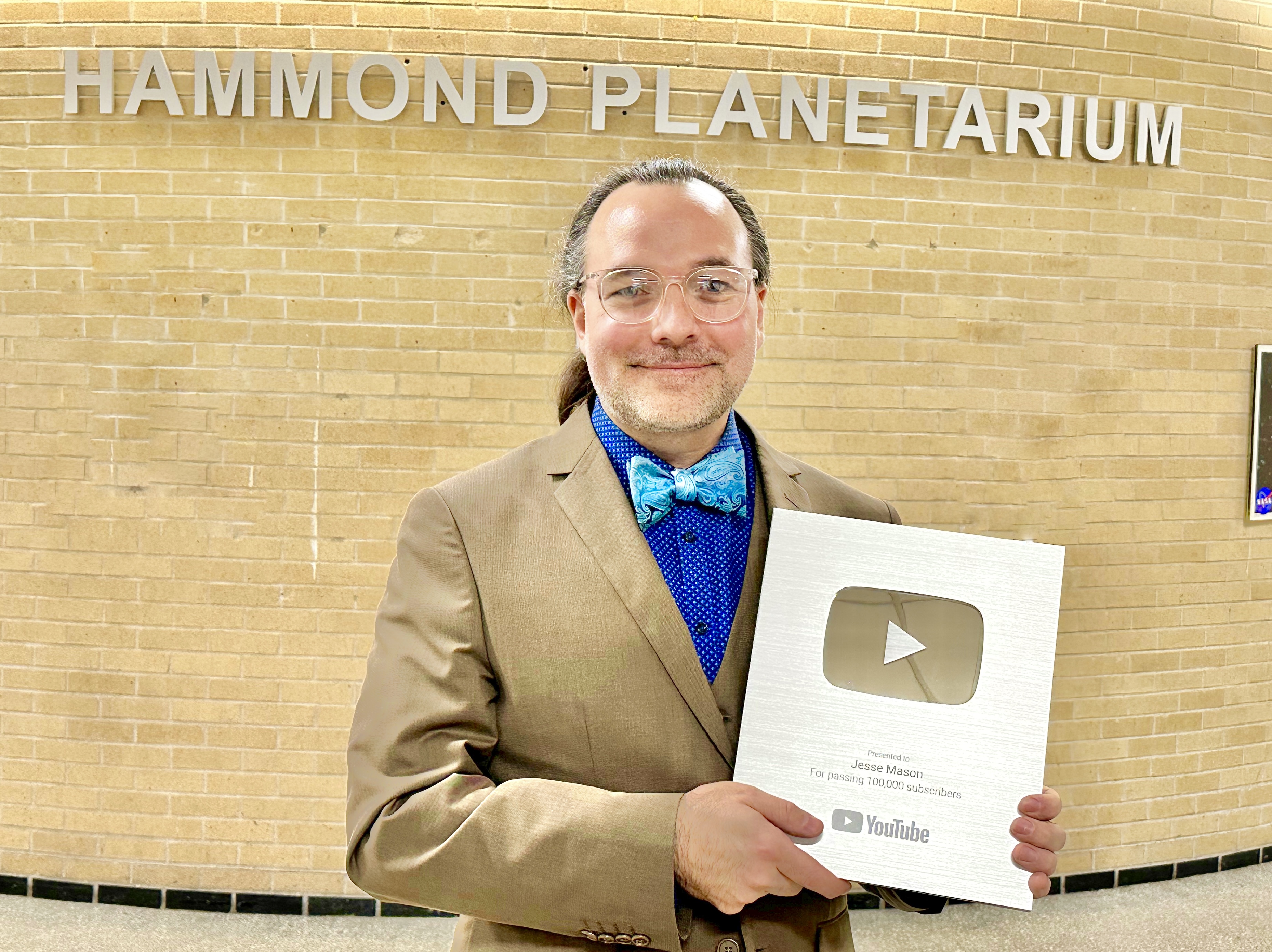HFC’s Jesse Mason wins YouTube Silver Creator Award for his physics videos

HFC physics and astronomy instructor Jesse Mason began teaching online long before it was common, and long before it became essential during the pandemic.
He got the idea to start producing videos in 2012 after several snow days had shut everything down. Mason didn’t want his students to fall behind in class. Recognizing the utility of remote lessons, he began recording problem-solving videos for his students, teaching himself audio and video production skills along the way.
“I noticed the view count climbing into the hundreds after a few weeks,” said Mason. “That got me curious about the market for physics videos online. I did some digging and discovered there was a serious need for high-quality instructional videos. I launched my channel a few days later and started seriously researching audio and video production.”
He continued: “Technology is empowering. If I can convey course material while empowering students with a new technological skill, I adopt the technology. I did this with online lectures on YouTube in 2012, assigning students videos to watch before class. I did this with 3D virtual environments with Saganworks in 2020, assigning students virtual exhibit presentations. And I did this with ChatGPT in my astronomy course during the Winter 2023 semester, assigning a variety of contextual essays on historical astronomy – it was a great success!”
The YouTube Silver Creator Award
Earlier this year, Mason was rewarded the YouTube Silver Creator Award. This award is given to YouTube channels that surpass 100,000 subscribers. His videos have attracted more than 11 million views – primarily from physics students and physics teachers – the world over.
“To me, this award represents countless hours spent in a joyous flow state where I was working deeply on my craft,” said Mason. “I'm a big believer in the importance of commemoration and remember surpassing my original goal for the channel of achieving 1 million views several years ago. I threw a big house party with a bonfire for my friends and family. My dad had a cake made with my channel avatar on it. Hitting that target was a big deal for me. To have met and exceeded that goal by an order of such magnitude is deeply satisfying and uniquely invigorating!”
(story continues after video below)
Mason’s most popular video: How to Solve Any Series and Parallel Circuit Problem
4.5 million views and counting...
Finding his calling in teaching
The eldest of two sons, Mason grew up in Ypsilanti and graduated from Saline High School. He is a two-time alumnus of Eastern Michigan University, where he earned his bachelor’s degree in physics and music and his master’s degree in physics. He lives in Livonia with his wife and four children.
During his time at EMU, Mason discovered his interest in physics. EMU physics instructor Joe Lowry ignited his passion for physics and astronomy after Mason took his Physics in the Arts course. Lowry asked Mason if he could teach a physics lab. Mason agreed.
“I would have told you at the time that I was just having a blast teaching physics labs,” said Mason. “Looking back, though, I would say I was finding my calling.”
Mason has been at HFC since 2008 and has been full-time since 2021. Not only does he teach physics and astronomy at HFC, he is the director of the Hammond Planetarium. Previously, Mason taught physics at EMU and Schoolcraft College, while working as a physics lab technician at Oakland Community College.
“I love experiencing that ‘aha!’ moment when I learn something new – and I love helping others experience that ‘aha!’ moment even more,” he said. “I got my first taste of sharing the joy of learning while teaching guitar as a teenager, and it was renewed when I started teaching physics labs in college.”
Creating YouTube’s first virtual experiment: a mysterious little black box
According to Mason, teaching is as much an art as a science. He thinks of his videos as a form of teaching art and gives them craftsman-level attention – from the blocking of a solution, to choosing the complementary colors, to word-smithing the script. He admits to spending an inordinate amount of time sweating the details for each video.
Mason has the distinction of creating YouTube’s first known virtual experiment in physics.
“When academia pivoted to remote teaching in 2020, I generated a lot of resources for physics teachers, including some recorded lab experiments,” he said. “But the experiments lacked the interactive nature of a true lab experiment, and I wished students could push a button on the screen and perform some part of the experiment. Coincidentally, I had seen a really cool choose-your-own-adventure series on YouTube called Quest and realized I could turn that same approach into a virtual experiment on YouTube, where students could decide what happened next by selecting which video to view next. After consulting with the Quest producer, I designed and produced a virtual experiment video series that teaches students the scientific method with a mysterious little black box.”
Seeing the bigger picture
People all over the world reached out to Mason, asking him for the solutions to his virtual experiment, because he didn’t post the solutions on the video series.
“I remember requesting that YouTube translate the video into Portuguese for a Brazilian science teacher who contacted me,” he said.
Over the years, Mason’s approach to producing YouTube videos has evolved, but his focus has never changed: to create the most valuable videos of their kind on the internet.
“The best part of teaching is making connections!” he said. “Helping people connect the dots to see a bigger picture of the world is great. But helping people connect the dots to see a bigger picture of themselves is even better.”